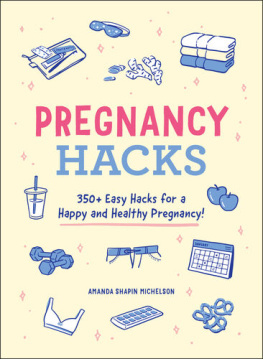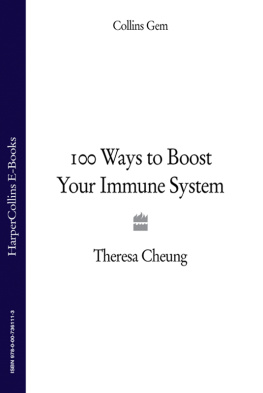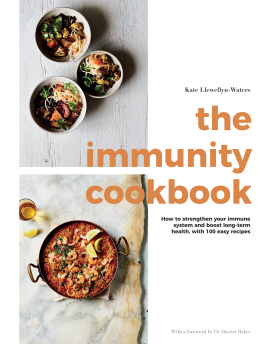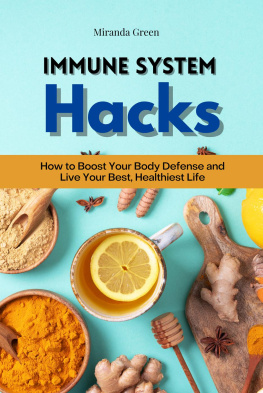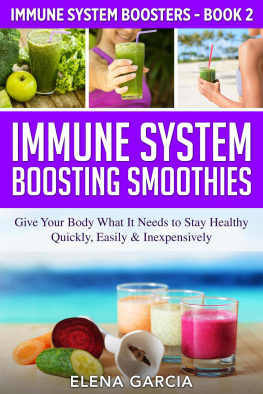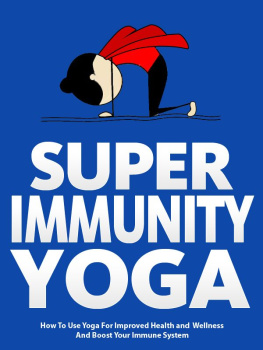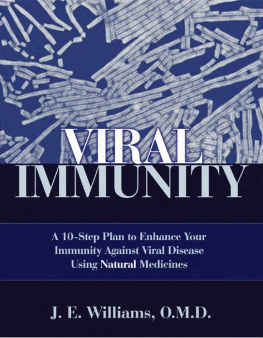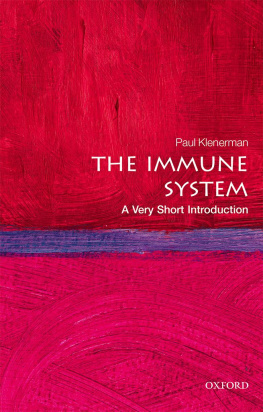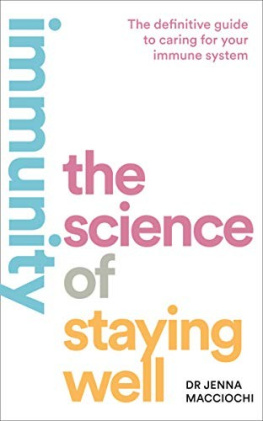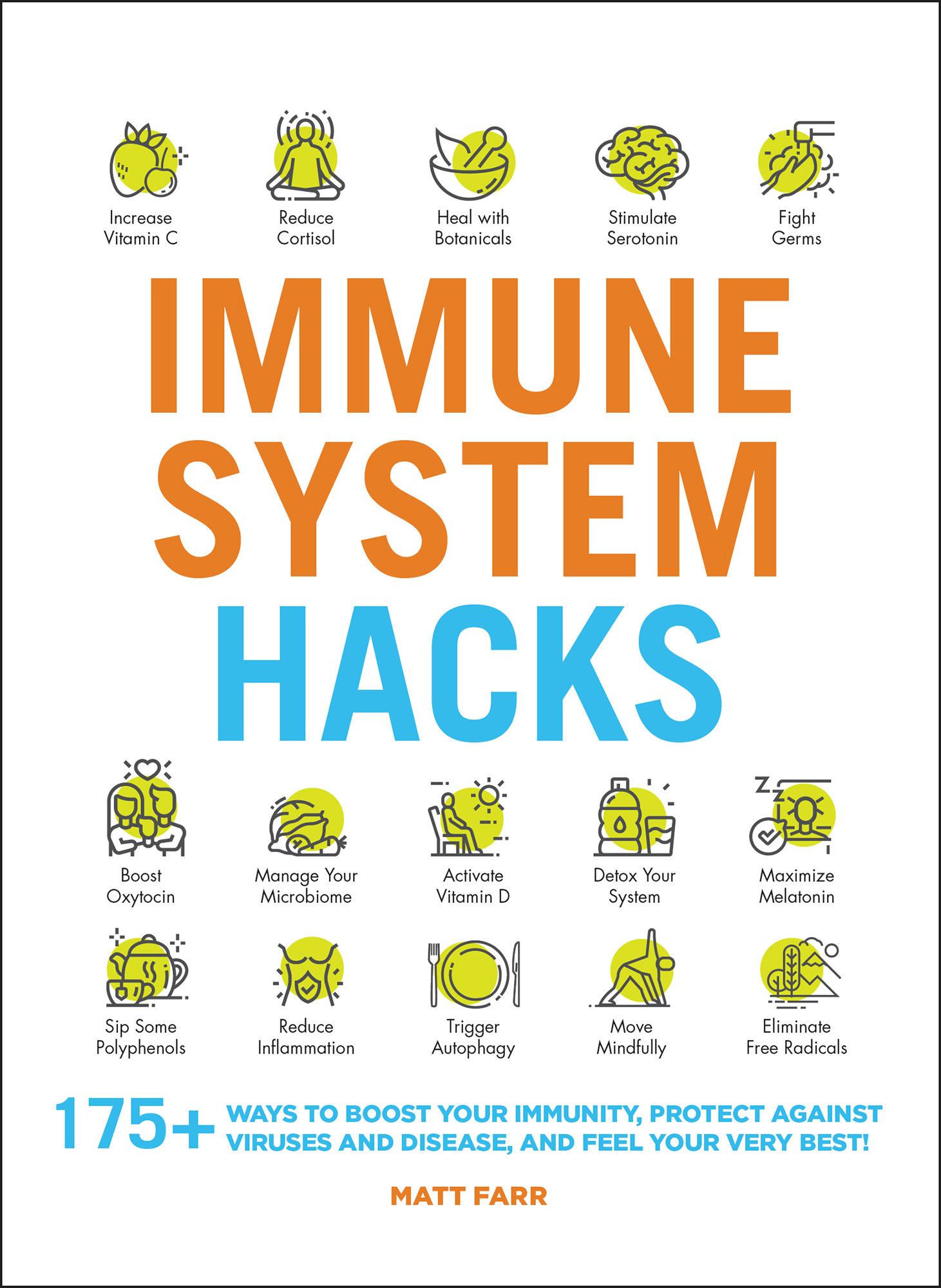Contents
Guide
INTRODUCTION
Its time to live your healthiest life!
The immune system is unique to any other system of your body as it has access to all your cells and tissues, working around the clock to protect you from germs, viruses, and more. Its deeply connected not just to every other system, but also to your environment and even your emotions. Everything from food sensitivity to stress can affect your immune health, and improving one means improving the other. To regulate your immune system is to regulate your whole beingbody and mind.
But just how do you nurture a healthy immune system? Immune System Hacks is here to help you do just that! In this book, youll find more than 175 easy hacks for developing a healthier, better functioning immune system. From foods and supplements that can protect against illness, to habits and therapies that heal chronic inflammation, there are hacks for almost every situation and immune condition. Youll discover holistic approaches to optimizing your immune system that also support your social, mental, emotional, and spiritual well-being.
Whether you are looking to protect yourself against infection, fight a current infection, reduce inflammation, or improve an allergy or autoimmune condition, this book will help you feel your best for years to come. Flip around to the hacks that stand out to you or read through each immune-boosting page.
HACK 001 MAKE FRIENDS WITH FUNGI
When choosing foods to help your immune system its hard to beat mushrooms. Mushrooms contain beta-glucan, a fiber that, when consumed, challenges and stimulates a response within the immune system to increase white blood cells that help fight infections. Over time, this effect strengthens the immune system. Among other uses, beta-glucans benefits have led to it being used in cancer therapy to help fight cancer cell growth.
In addition to boosting immunity, beta-glucan has also been shown to:
- Lower cholesterol
- Suppress appetite
- Slow the absorption of glucose from the gut into the bloodstream (benefiting those with insulin resistance/diabetes)
There are nutritional supplements available that contain beta-glucan, but you can also source it from your diet by consuming foods such as mushrooms, oats, and barley. The added benefit of consuming mushrooms specifically is that they also contain some of the highest levels of plant-based vitamin D, another immunity-boosting nutrient.
Mushrooms that are highest in beta-glucans include shiitake, maitake, and reishi. One hundred grams of mushrooms contains 0.20.5 grams of beta-glucan. Consuming more than 3 grams of beta-glucans per day shows benefits. If you have an autoimmune condition, be cautious with consuming large amounts of beta-glucancontaining foods due to their immune-stimulating properties.
HACK 002 SING YOUR HEART OUT
Think of the last time you sang along with your favorite song. By the end of it you felt pretty amazing, right? Your mood was elevated, your spirit felt free, and any stress you may have felt had evaporated. We instinctively know the therapeutic benefits of singing. And science backs this up.
When you sing, you engage your vocal chords, which are in close proximity to a very important nerve known as the vagus nerve. This nerve is the home of your parasympathetic nervous system (PNS). When this part of your nervous system is fully activated, your immune, digestive, and detoxification systems are operating optimally. Low PNS activation means poor immune health.
When you sing, your vocal chords vibrate and stimulate this part of the nervous system. Additionally, a study by the Royal College of Music showed that just one hour of singing in a choir boosted the release of immune cytokines (a type of white blood cell), lowered cortisol levels, and elevated levels of oxytocin in cancer patients. Cortisol is the bodys main stress hormone, and it inhibits the immune system. Oxytocin is the feel-good, love/bonding hormone we all crave.
So go ahead: Put on your favorite music and sing along.
HACK 003 SOAK UP SOME LUNCHTIME RAYS
You may already be aware that vitamin D is very important to the function of your immune system, and that your body produces it as a result of sun exposure. But what you may not know is that sunlight doesnt trigger this response at all times throughout the day or year.
For optimal immune health, the best time to be outdoors is when the clock strikes noon. Why?
It all comes down to the relationship between your body and the sunspecifically the different wavelengths of light emitted by the sun. The most familiar wavelengths are those visible in a rainbow, which result from the light waves separating out as they travel through water droplets or a prism. Each color corresponds to a different wavelength of light.
Not all light waves reach the earth at the same time. Some penetrate the atmosphere at only specific times of day, or during specific seasons. Ultraviolet B (UVB) is the wavelength most important to your immune system. It is only when UVB waves reach the skin that the body produces vitamin D. UVB reaches the earth from early-to-mid-spring to early fall and is strongest when the sun is at its highest point in the sky (midday). UVB is virtually nonexistent when the sun is low in the sky. From mid-spring UVB levels increase, as does the duration of their availability. Levels decrease at the end of summer, and by mid-autumn they dont exist. If you live closer to the equator youll experience higher levels of UVB for longer periods both during the day and across the year compared to the rest of the world, meaning youll have a bit more flexibility on when you get outside for some vitamin D.
What better reason do you need to get outdoors for lunch?
HACK 004 EMBRACE GARLIC BREATH
Garlic belongs to a group of vegetables known as alliums that have been used to help treat a variety of conditions including fevers, gastrointestinal conditions, earaches, cholera, and even the flu. Aside from garlic, allium vegetables include onions, scallions/spring onion, leeks, shallots, and chives.
One of the main reasons for the immune effects of alliums is the compound alliin (highest in garlic). When chewed, alliin releases a sulfur compound known as organosulfur which has powerful antioxidant, antiviral, and antibacterial properties. Plants contain these high levels of sulfur in order to protect themselves against predators; its what makes you tear up when you chop an onion and why you get smelly breath when you eat these vegetables.
Garlic has also been shown to help prevent colds and the flu in part because it helps increase white blood cell numbers when you become infected.
Aside from alliin, allium vegetables also support immune health because they contain:
- Immune-boosting vitamin C, potassium, and selenium
- Quercetin (a powerful antioxidant)
- Flavonoids, which raise glutathione levels needed for immune and detoxification processes
- Fructans (in garlic and onion only), which feed the bacteria in your gut that boost your immunity
In order to provide these benefits, allium vegetables must be chopped, crushed, or chewed so the alliin can release the powerful sulfur compounds. While there is no standard for garlic intake, studies have shown consuming 210 grams of garlic per day (12 cloves) can boost your immune system. Garlic capsules can also be taken if preferred.

